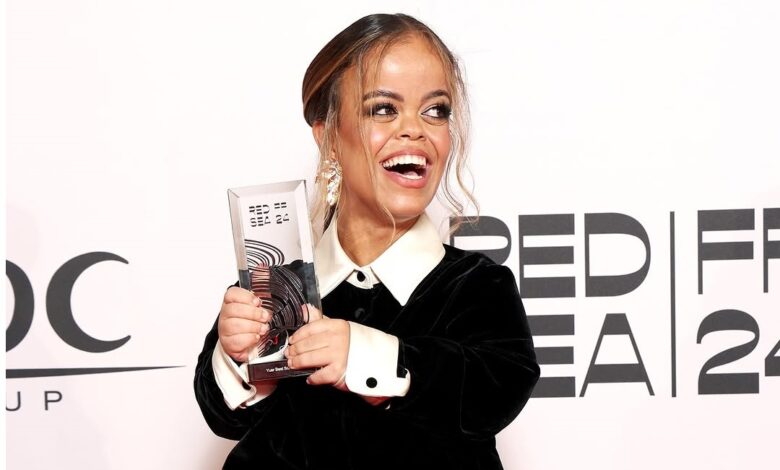
A moment that captured hearts and eyes during the fourth edition of the Red Sea International Film Festival, which concluded a few days ago, was that of Egyptian actress Mariam Sherif embracing the “Yusr” award for Best Actress, for her role in “Snow White – The Untold Story” (2024).
She triumphed over 16 other highly skilled international competitors.
This was Sherif’s first time in front of the camera, yet within a few weeks, guided by director Tghreed Abu Al-Hassan’s workshops and her own innate talent and determination, she managed to become the focus of the awards.
The value of the award is multiplied when a renowned director and actor like Spike Lee, who headed the jury, personally presented her with the acting award
Let’s set aside the pre-conceived sympathy for shorter people in artistic evaluations. The film was careful to provide a neutral reception, making the dramatic character the hero, rather than the physical stature of the character. We will delve deeper into this complex point shortly.
This wasn’t the only Egyptian award.
Khalid Mansour’s “Seeking Haven for Mr Rambo” won the jury prize. It’s one of the boldest films I’ve seen in recent years. It rebelled against many conventions of Egyptian cinema, even those imposed by society under the guise of preserving morality.
It seems like a fair demand to want morality to prevail everywhere, yet it’s often used as a pretext – but now isn’t the time to delve into that. Arab cinema, according to the festival’s results, is in good shape despite all the obstacles and barriers it faces.
In the face of backlash, there will always be artists who can connect with the audience. There will also be festivals that award those who deserve it, without ulterior motives.
And we will always find an audience eager for creativity.
The Tunisian film “The Red Children,” (2024) directed by Lotfi Ashour, deservedly won the most prestigious awards – the Golden Yusr for Best Film and the Best Director award.
The film tackles the issue of armed terrorism in the name of religion and emphasizing its persistence, always lurking and waiting for opportunities. A mother loses her son and only receives his head, refusing to bury him, insisting that she gave birth to him whole, and he should be buried whole. This tragic event sets the film’s sorrowful journey in motion.
The film leaves room for the audience to understand that terrorists still pose a threat, despite the relative calm and the apparent control of the situation by security forces.
The reality, however, reveals a different truth: there is fire beneath the ashes. Based on a real-life event, the film is a shadow of reality.
The Iraqi film “Songs for Adam,” (2024) written and directed by Oday Rasheed, won the screenplay award. It delves into the theme of innocence, following a child who witnesses his grandfather’s washing before burial. This experience births a psychological complex, making him unconsciously resist growing older.
He yearns for humanity’s primal dream of becoming like Adam, but without sin and its consequences. The devastating message is that we can never remain innocent children.
The Saudi film “Hobal,” (2024) directed by Abdulaziz Alshlahei, won the Audience Award, proving that the director successfully connected with the viewers.
But let us revisit the scene that will linger long after the festival – Mariam Sherif embracing her award.
Short people contribute significantly to the world of art, yet in Egyptian cinema, we often see mockery bordering on bullying. For example, the film “The Average White Man” (2001) shows comedic actor Ahmed Adam cruelly manhandled a short person, insisting on putting him in the toilet and flushing.
What disturbed me wasn’t just the actor’s attempt at a cheap laugh, but the fact that the audience was laughing hysterically, their laughter intensifying with each cruel act.
It felt as though we were all suffering from sadism.
This unfortunate tradition of treating short people poorly is being challenged through art, thanks to the vision of director Taghreed Abu Al-Hassan and Sherif’s brilliant performance. We don’t see her suffering because of her height – instead, we see a human being who has the right to live in society as a full person with rights and responsibilities.
Will Sherif continue this journey? We have the global star Peter Dinklage, who has often been cast in leading roles and has won numerous awards and Oscar nominations. He doesn’t play the role of a short person; he plays whatever dramatic role is required of him.
Sherif has proven she can do the same and has a natural talent for performing. Clearly, there needs to be a director who can grasp this magic and navigate the delicate nuances.
She has a lot to offer in terms of dramatic performance, and now the ball is in the audience’s court to change their emotional response.
Congratulations to Sherif on winning the Yusr Award, and congratulations to everyone who sees people as people.
Author’s biography:
Tarek al-Shenawy is a journalist, film critic, and professor of film criticism at the Faculty of Mass Communication, Cairo University.
He holds a Bachelor’s degree from the Faculty of Mass Communication in Cairo University, and a Bachelor’s degree from the Institute of Cinema.
Shenawy has won numerous awards for best critical article from the Syndicate of Journalists multiple times, as well as from film societies. He was awarded the title of Best Popular Film Critic by the “Der Giest” Association in 2015, a title that has not been awarded to anyone since.
He has also chaired and participated in the judging committees of numerous international film festivals, including the Valencia and Dubai Film Festivals.
He began practicing film criticism nearly 35 years ago in the Rose al-Yousse magazine and continues to write a weekly column titled “Kalma we Nos (Word and a Half)” on its pages. He has written for numerous magazines, newspapers, and websites both inside and outside Egypt.
He currently writes a daily column in Al-Masry Al-Youm newspaper and a weekly column in Al-Sharq al-Awsat newspaper, and has published over thirty books.




